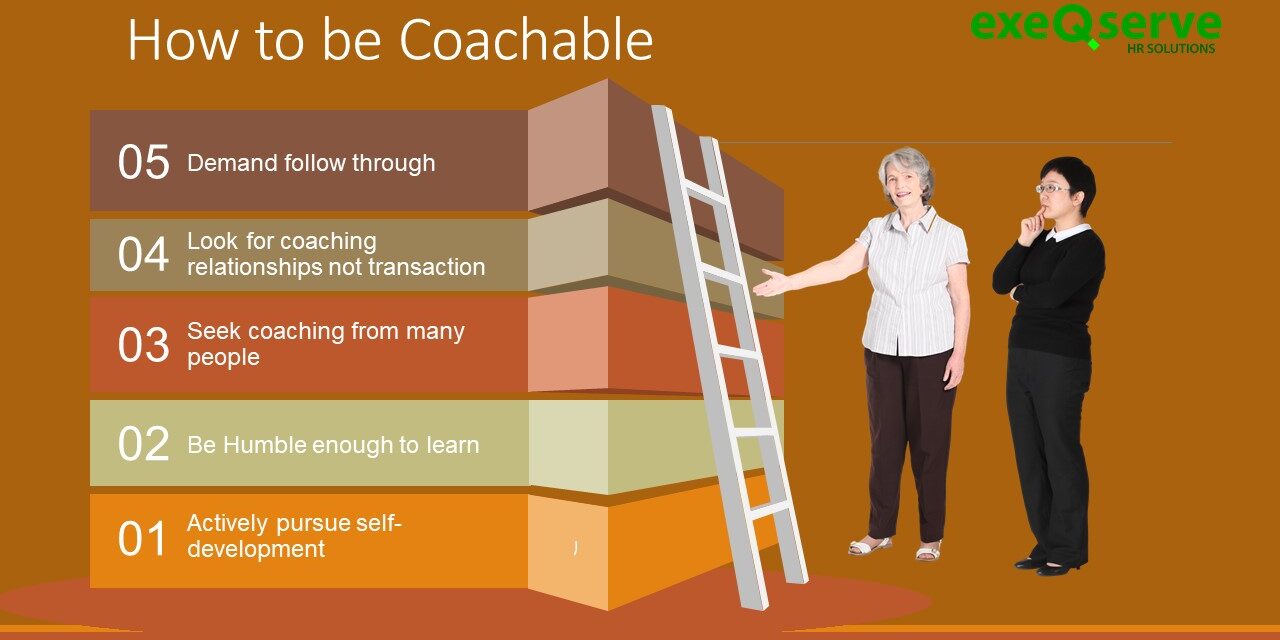In this post, I wish to share my thoughts on three things; indicators that one is coachable, the value of coachability and how to be coachable.
Are you Coachable?
Let me start with what I think are indicators of one’s coachability. Try to answer the following questions:
- Are you actively seeking to improve your performance not just your knowledge?
- Is there someone or some people you consider to be your mentors or coaches?
- Are your conversations with your mentor frequent enough to influence your knowledge and performance?
- Have you had a conversation recently that you would consider coaching, and you are the coachee?
- Have you learned something from someone recently?
- Did you recently change anything in the way you do things as a result of feedback, or insights brought about by a conversation with someone?
If you said yes to all these and can cite critical incidents for when they happened, congratulations! You don’t need to read the rest of this article. You probably already know about what you’ll get to read next.
Why Be Coachable
Many people, including managers and those who aspire to be executive or life coaches, make an effort to improve their skills, and rightly they should, because it helps improve the outcomes of coaching engagements. But the truth is, the best coach is no match to un-coachable person. The only way to coach an un-coachable person is if the person decides to be coachable. Now, if you found yourself to be un-coachable because you said no to a lot of the questions above, you can see here that there is hope. There is a switch you can flick to shift from un-coachable to coachable. Remember that the coach’s skill is secondary to your willingness to be coached and your willingness to change.
Why be coachable? Coachability, is a willingness to learn from others. When you are coachable, you get to benefit from the experience and wisdom of others. You are also able to make maximum return from feedback, become more self-aware, and flexible to change. Many people resist coaching because they are not ready to accept their weakness or are afraid that they can’t be better than they already are. It’s called fixed mindset. Nothing holds one back from achieving one’s full potential than not wanting to change or grow.
How to be Coachable
There are just too many benefits to being coachable to avoid it. If you feel that you have not fully benefited from it and want to turn that around, here are a few ideas on how to increase your coachability.
- Decide to pursue self-development. Decide on your life’s growth areas and have a vision of the kind of personal growth you want to see in the immediate and distant future. It always helps to have an immediate and long-term goal. When you engage someone to be your coach or mentor make sure that you are clear about your personal development agenda.
- Be humble enough to learn. The lessons will present themselves through different people, from formal to informal coaches. One of our biggest mistakes is that we size up the people we speak with and disregard learning opportunities with ones we feel we’re more superior to.
- Seek coaching. Drive your own personal development by asking those who can help you to be your mentor or coach. When someone like your supervisor or manager offers to coach, there is a good chance they see something you need to correct or improve. Nothing wrong with that. However, if you really want to grow, seek developmental coaching, where the goal is to pursue your goals and not just address a performance issue.
- Make sure that there are follow through and check-ins. Coaching is a relationship, and not a single transaction. Many coaching efforts fail because both coach and coachee engage in an awkward conversation about a performance issue and then expect that things are going to get better because of that single conversation. Or they don’t. They just must go through that conversation as a token intervention that they don’t expect to succeed. When you ask to be coached. Ask for regular review meetings that give you an opportunity to assess your growth and recalibrate developmental strategies and efforts.
Think about some of the most successful coaching relationships. They’re found in sports where coaching is expected, and the athletes/talents expect and seek it. Those who don’t, no matter how talented, will be cut and replaced by those who can adjust so they can perform better. No one enters sport thinking he or she is already at the peak of his or her performance and won’t need any more coaching to get better. The fastest way to grow is to seek help on your developmental journey.
Be success-oriented, be coachable.
If you want to learn how to be more coachable or want to help the people in your organization enhance their coachability skill, check out this link.







